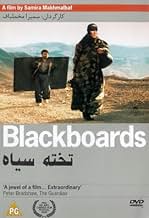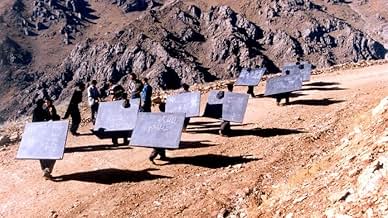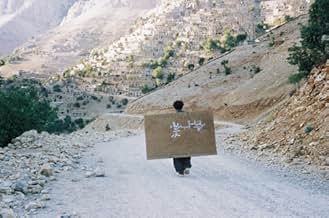Ajouter une intrigue dans votre langueKurdish teachers Said and Reeboir roam Iranian villages near Iraqi border during war. Said guides displaced men, marries widow Halaleh. Reeboir joins child smugglers. Amid danger, they try t... Tout lireKurdish teachers Said and Reeboir roam Iranian villages near Iraqi border during war. Said guides displaced men, marries widow Halaleh. Reeboir joins child smugglers. Amid danger, they try teaching nomadic students while soldiers patrol.Kurdish teachers Said and Reeboir roam Iranian villages near Iraqi border during war. Said guides displaced men, marries widow Halaleh. Reeboir joins child smugglers. Amid danger, they try teaching nomadic students while soldiers patrol.
- Prix
- 3 victoires et 3 nominations au total
Histoire
Le saviez-vous
- ConnexionsFeatured in Samira cheghoneh 'Takhté siah' rol sakht (2000)
Commentaire en vedette
'Blackboards' is one of those films that has divided audiences between fanatical admirers and grumbling dissenters. The former admire the director's skilful juggling between formalism and humanism, individual quests and social movements, private moments and public set-pieces; her filming of landscape; her eliciting of unsentimental, compelling performances from an amateur cast; her insistence on enigma and loose ends; her portrait of life in extreme, harrowing conditions. The dissenters bemoan her fudging of politics - sure, she shows the exploitation of children, the mass displacement of the Kurds, and the murderous terror lurking behind every rock, but by refusing to put these in a contextual framework, such depictions are blunted in political force.
there is a whiff of misogyny to me in these complaints. It's okay for men to make ambitious, universalising statements, but women must remain concerned with the local. Presumably Makhmalbaf would have been more political if she had concentrated on authenticating the patterns on the women's dresses. Of course, culture in general has moved towards the local: with post-modernism, very few artists have had the confidence to think on a large scale (I don't mean make large-scale films, which any fule kan do).
This is presumably why 'Blackboards' reminds me of older types of artists. Most immediately, it could be a massive Beckett play, full of wandering vagrants in a vast, desolate landscape, peopled with Lucky-like slaves, surrounded by an unseen, God-like menace, occasionally erupting in capricious violence. Like Beckett, there is no real beginning or end, no context, just a sense of never-ending repetition with the only possible relief in death.
Like Beckett (eg 'Waiting for Godot'), culture has no place in such an environment, indeed, seems a grotesque irrelevance, an incomprehensible babble, traces scraped in a landscape no-one can read now, never mind in the future. And yes, the film is as unremittingly hopeless as a Beckett play - there is no progress or redemption here. But it is as bleakly funny too - eg the whole marriage farrago between Said and Hahaleh; the game of marbles watched by her son; the tragicomic, very Beckettian inability of her aged father to relieve himself.
In the film world, 'Blackboards' reminds me of no-one so much as Angelopolous, especially in a film like 'The Travelling players', where a group of itinerant outsiders observe and become absorbed in an unfamiliar community. Makhmalbaf has Angelopolous' confidence in allegory, a way of dramatising in mythic form life and displacement under a totalitarian regime, without in any way 'abstracting' the violence and pain.
The empty landscapes suddenly being inexplicably over-run by faceless crowds also has the millenarial feel of Andersen's recent 'Songs from the second floor', or later Bunuel, from whom the theme of the journey, coming across strange, surreal strangers (eg the uncanny scene with the masked gardener whose son languishes in an Iraqi jail), or images such as the blackboard-hauling men like grounded birds watching blackbirds in the sky, and overhearing another, ominous, unseen flying object, derives. There are many, many ways of being political.
Unlike these masters, however, who prefer irony and distant tableaux, Makhmalbaf, through restless handheld camerawork, gets right in between her characters and makes us feel for them.
there is a whiff of misogyny to me in these complaints. It's okay for men to make ambitious, universalising statements, but women must remain concerned with the local. Presumably Makhmalbaf would have been more political if she had concentrated on authenticating the patterns on the women's dresses. Of course, culture in general has moved towards the local: with post-modernism, very few artists have had the confidence to think on a large scale (I don't mean make large-scale films, which any fule kan do).
This is presumably why 'Blackboards' reminds me of older types of artists. Most immediately, it could be a massive Beckett play, full of wandering vagrants in a vast, desolate landscape, peopled with Lucky-like slaves, surrounded by an unseen, God-like menace, occasionally erupting in capricious violence. Like Beckett, there is no real beginning or end, no context, just a sense of never-ending repetition with the only possible relief in death.
Like Beckett (eg 'Waiting for Godot'), culture has no place in such an environment, indeed, seems a grotesque irrelevance, an incomprehensible babble, traces scraped in a landscape no-one can read now, never mind in the future. And yes, the film is as unremittingly hopeless as a Beckett play - there is no progress or redemption here. But it is as bleakly funny too - eg the whole marriage farrago between Said and Hahaleh; the game of marbles watched by her son; the tragicomic, very Beckettian inability of her aged father to relieve himself.
In the film world, 'Blackboards' reminds me of no-one so much as Angelopolous, especially in a film like 'The Travelling players', where a group of itinerant outsiders observe and become absorbed in an unfamiliar community. Makhmalbaf has Angelopolous' confidence in allegory, a way of dramatising in mythic form life and displacement under a totalitarian regime, without in any way 'abstracting' the violence and pain.
The empty landscapes suddenly being inexplicably over-run by faceless crowds also has the millenarial feel of Andersen's recent 'Songs from the second floor', or later Bunuel, from whom the theme of the journey, coming across strange, surreal strangers (eg the uncanny scene with the masked gardener whose son languishes in an Iraqi jail), or images such as the blackboard-hauling men like grounded birds watching blackbirds in the sky, and overhearing another, ominous, unseen flying object, derives. There are many, many ways of being political.
Unlike these masters, however, who prefer irony and distant tableaux, Makhmalbaf, through restless handheld camerawork, gets right in between her characters and makes us feel for them.
- the red duchess
- 1 avr. 2001
- Lien permanent
Meilleurs choix
Connectez-vous pour évaluer et surveiller les recommandations personnalisées
- How long is Blackboards?Propulsé par Alexa
Détails
Box-office
- Brut – États-Unis et Canada
- 23 520 $ US
- Fin de semaine d'ouverture – États-Unis et Canada
- 3 416 $ US
- 8 déc. 2002
- Brut – à l'échelle mondiale
- 41 772 $ US
Contribuer à cette page
Suggérer une modification ou ajouter du contenu manquant

Lacune principale
By what name was Le tableau noir (2000) officially released in India in English?
Répondre






